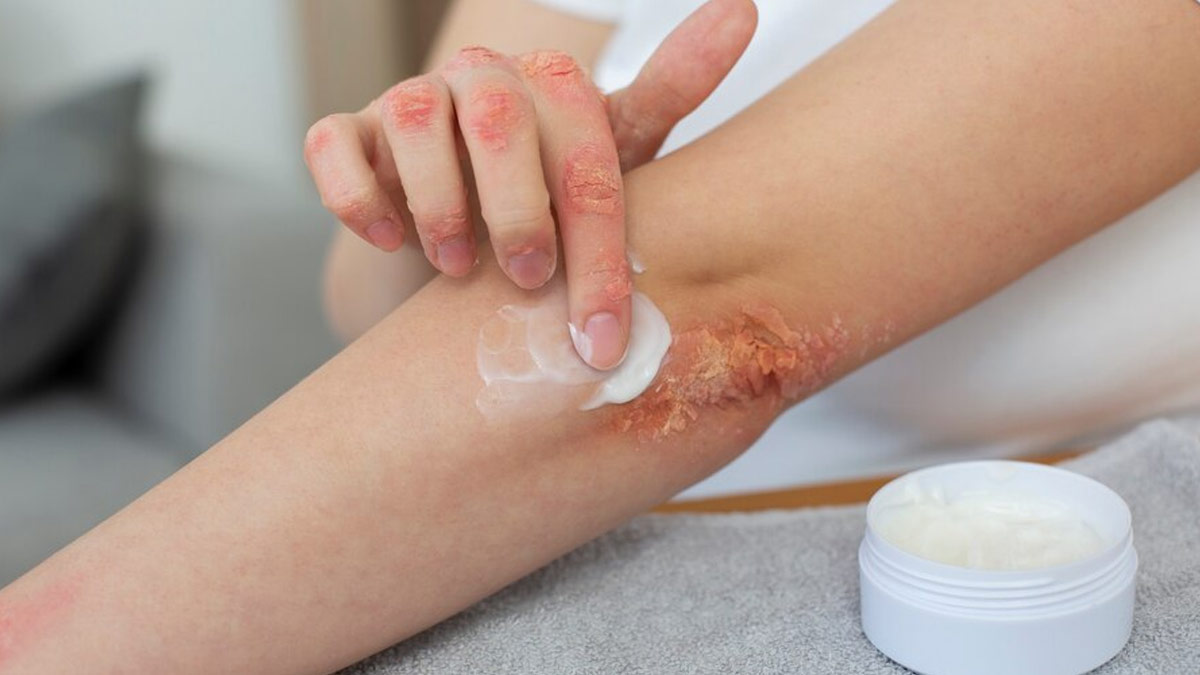
You may know how tedious hair removal can be, especially if you have sensitive skin. Then imagine, how painstaking this process must be for those dealing with conditions that cause skin flare-ups like eczema. If you are also dealing with eczema and looking for solutions that allow you to remove hair from your body successfully, here’s a guide for you.
Table of Content:-
Talking to the team of Onlymyhealth, Dr Kiran Sandeep Singh, Certified Cosmetologist and Owner, Beeshakha Health Centre, and Associate Director, Quality and Operations, Terna Speciality Hospital and Research Centre, Navi Mumbai, Maharashtra, India, explained how you can deal with the challenges of hair removal if you have eczema.
Hair Removal Challenges Of Eczema
The National Health Service defines eczema, or atopic dermatitis, as a chronic skin condition that causes inflamed, itchy, and red patches of skin. It often appears on the face, hands, and feet, but can affect any part of the body. Eczema is caused by a combination of genetic and environmental factors that lead to a compromised skin barrier, making the skin more susceptible to irritants and allergens.
“Hair removal is challenging for individuals with eczema-prone skin. Sometimes, hair removal creams or waxing may make eczema worse. Cosmetic treatments, such as laser hair removal, that minimises hair from ever growing back can also make your eczema worse,” said Dr Singh.

Safe Hair Removal Tips For Eczema
If you are dealing with eczema and wondering which hair removal method you should choose, here’s a breakdown by Dr Singh:
Shaving
If you have eczema, then you should exercise caution while shaving to avoid exacerbating your condition. Choosing electric razors may not provide as close a shave as normal razors but can reduce the risk of nicks and cuts to the skin. Compared to a traditional razor, even using a hair or beard trimmer set to a low setting is gentler on the skin.
However, if you do engage in wet shaving, use a sharp razor specifically designed for sensitive skin. Also using razors that have been heavily used may cause friction and may result in a stinging sensation on the skin.
Waxing
Dr Singh advised against waxing if you have eczema. “Waxing is often not tolerated well by people with eczema.” She said that waxing is more likely to irritate sensitive skin and the chemicals in the wax can damage the skin further.
Laser Hair Removal
Dr Singh said, “Although laser hair removal can be expensive, it is often hailed as the safest, most definitive, and least invasive method of hair removal for people dealing with eczema.
However, she suggested to consult with a dermatologist or an experienced professional before considering laser hair removal. They can assess your skin condition and determine if it is a suitable option for you.
Also Read: Trying To Manage Atopic Dermatitis Or Eczema? Expert Recommends Silk Clothing To Avoid Flare-Ups

How To Prepare Your Skin Before Shaving
Dr Singh shared that there are some safety precautions you should take to prepare your skin before hair removal. This can help you minimise irritation or exacerbation of exacerbation symptoms:
- Moisturise And Hydrate Skin: Applying a thin layer of moisturising cream before shaving is recommended followed by an additional application afterwards to keep the skin hydrated. Use lukewarm water to moisten the area you want to shave. Avoid hot water as it can dry your skin further.
- Exfoliate When Possible: Once you have shaved your skin, using a mild scrub after moisturising can keep your skin healthy, make it less prone to damage and irritation, and reduce the risk of ingrown hairs. Dr Singh suggested using a mild scrub containing glycolic or other alpha hydroxy acid.
- Keep Your Razor Clean: Make sure your razor blades are clean and disinfected. This can help you avoid infections as pathogens can creep into your body through the inflamed eczema skin.
- How To Shave: Shave slowly and in a downward direction with the hair growth. This is a soft approach for sensitive skin with eczema flare-ups.
- Products To Use For Shaving: Use products specifically designed for shaving. It's crucial to use a shaving cream or mousse because shaving can remove the outermost layers of skin. Opt for products that contain emollients and occlusive agents to protect and moisturise the skin. Choose shaving products containing coconut oil, aloe vera, and hyaluronic acid, as these ingredients soften the hair and provide a smooth shave. Always check product labels to ensure they are fragrance-free, soap-free, and suitable for sensitive skin.
Also Read: Can A Humidifier Reduce Atopic Dermatitis Symptoms And Prevent Breakouts? Expert Answers
Dr Singh concluded that the best way to find a long-term hair removal solution if you have eczema is to treat and manage eczema on time. Keeping eczema-prone skin well-moisturized is essential, starting with a daily shower using a soothing body wash. Consistent, long-lasting hydration helps improve the skin barrier, which can make future flare-ups less severe. Plus, hydration should come from within as well, so it's important to maintain adequate water intake. Aim to drink the recommended eight 8-ounce glasses of water each day to support overall skin health.
Also watch this video
How we keep this article up to date:
We work with experts and keep a close eye on the latest in health and wellness. Whenever there is a new research or helpful information, we update our articles with accurate and useful advice.
Current Version